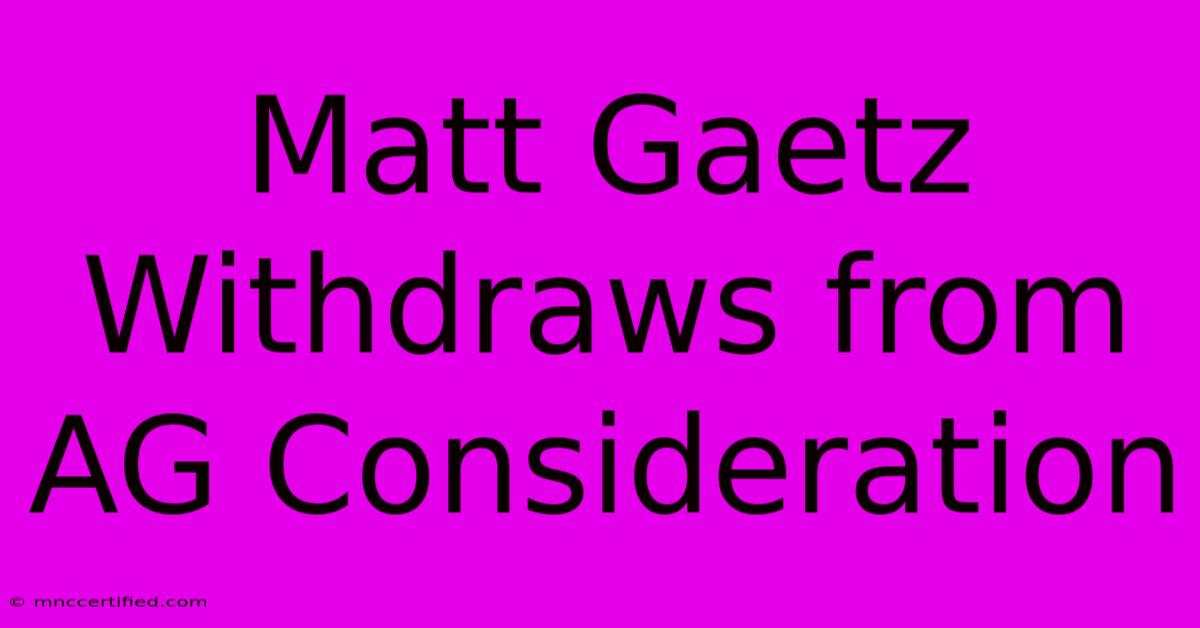Matt Gaetz Withdraws From AG Consideration

Table of Contents
Matt Gaetz Withdraws from AG Consideration: A Deep Dive into the Fallout
Keywords: Matt Gaetz, Attorney General, AG, withdrawal, consideration, Florida Congressman, political implications, Republican Party, investigation, scandal, future prospects
The political world was abuzz recently with the news that Florida Congressman Matt Gaetz withdrew his name from consideration for Attorney General. This decision, though seemingly abrupt, follows a period of intense speculation and scrutiny surrounding his past conduct. This article will delve into the reasons behind his withdrawal, analyzing the potential implications for both Gaetz himself and the broader political landscape.
The Weight of Past Allegations
Gaetz's withdrawal can't be viewed in isolation from the ongoing investigations and controversies swirling around him. For years, he's faced allegations of sexual misconduct and campaign finance violations. While never formally charged, these accusations have cast a long shadow over his political career, making his suitability for the prestigious role of Attorney General highly questionable. The immense public scrutiny that would accompany such a position likely played a significant role in his decision.
The Public Pressure Factor
The intense media attention and public outcry following his initial consideration for the position undoubtedly contributed to his withdrawal. Many argued that his past actions would severely undermine the credibility and integrity of the Department of Justice. This public pressure, coupled with the likely difficulty of obtaining Senate confirmation given the existing controversies, likely pushed Gaetz towards withdrawing. The potential for a protracted and damaging confirmation battle likely proved too daunting.
Political Implications and Future Prospects
Gaetz's withdrawal has significant implications for the Republican Party and his own political future. The party now faces the challenge of finding a suitable replacement, someone who can command broad support and avoid similar controversies. For Gaetz, the move represents a setback, potentially signaling a change in his political trajectory.
Damage Control and Rebuilding Trust
The withdrawal could be interpreted as a strategic move to minimize further damage to his reputation. By stepping aside, he might aim to rebuild his image and potentially lay the groundwork for a future political comeback. However, the long-term impact of these allegations will likely persist, influencing public perception and hindering future political ambitions.
Impact on the Republican Party
The Republican Party's search for a new Attorney General candidate is now complicated by Gaetz's withdrawal. The party needs to find a candidate who can effectively balance the needs of its diverse base and win the support of a potentially divided Senate. The timing of this withdrawal, relatively close to potential nomination, added to internal pressure and strategic planning challenges within the party.
Conclusion: A Shifting Political Landscape
Matt Gaetz's withdrawal from Attorney General consideration marks a significant turning point in his career and has broader implications for the Republican Party. The controversies surrounding him underscore the increasing importance of ethical considerations and public perception in modern politics. While his future remains uncertain, the event highlights the fragility of political careers in the face of persistent scrutiny and allegations. The ongoing investigations and their eventual outcomes will continue to shape the narrative surrounding Matt Gaetz and influence the political landscape for years to come. The need for thorough vetting of political candidates, particularly those considered for high-profile positions, has been brought sharply into focus by this recent event.

Thank you for visiting our website wich cover about Matt Gaetz Withdraws From AG Consideration. We hope the information provided has been useful to you. Feel free to contact us if you have any questions or need further assistance. See you next time and dont miss to bookmark.
Featured Posts
-
Food Science Summer School Penn State
Nov 22, 2024
-
Coleen And Rooney Competing Tv Shows
Nov 22, 2024
-
Shelter Insurance Clarksville Ar
Nov 22, 2024
-
Trump Names Bondi Attorney General
Nov 22, 2024
-
Bidens Statement New Warrants
Nov 22, 2024